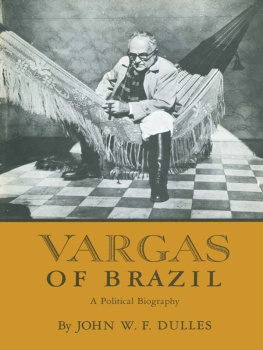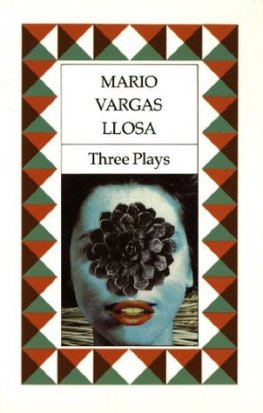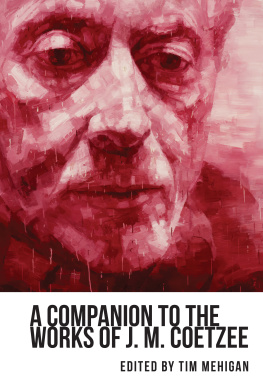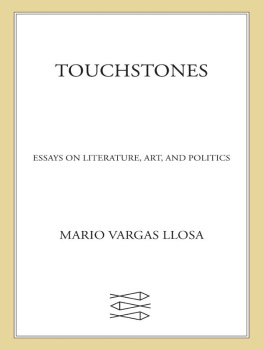John W. F. Dulles - Vargas of Brazil: A Political Biography
Here you can read online John W. F. Dulles - Vargas of Brazil: A Political Biography full text of the book (entire story) in english for free. Download pdf and epub, get meaning, cover and reviews about this ebook. City: Austin, year: 1967, publisher: University of Texas Press, genre: Non-fiction / History. Description of the work, (preface) as well as reviews are available. Best literature library LitArk.com created for fans of good reading and offers a wide selection of genres:
Romance novel
Science fiction
Adventure
Detective
Science
History
Home and family
Prose
Art
Politics
Computer
Non-fiction
Religion
Business
Children
Humor
Choose a favorite category and find really read worthwhile books. Enjoy immersion in the world of imagination, feel the emotions of the characters or learn something new for yourself, make an fascinating discovery.
- Book:Vargas of Brazil: A Political Biography
- Author:
- Publisher:University of Texas Press
- Genre:
- Year:1967
- City:Austin
- Rating:3 / 5
- Favourites:Add to favourites
- Your mark:
Vargas of Brazil: A Political Biography: summary, description and annotation
We offer to read an annotation, description, summary or preface (depends on what the author of the book "Vargas of Brazil: A Political Biography" wrote himself). If you haven't found the necessary information about the book — write in the comments, we will try to find it.
The dominant public figure in Brazil from 1930 until 1954 was a highly contradictory and controversial personality. Getlio Vargas, from the pampas of the southern frontier state of Rio Grande do Sul, became the dictator who ruled without ever forgetting the lower classes.
Vargas was a consummate artist at politics. He climbed the political ladder through seats in the state and national legislatures to the post of federal Finance Minister and to the governorship of Rio Grande do Sul. His career then took him to the National Palace as Provisional President and as Constitutional President, and later as the dictator of his New State. After his deposition in 1945 and a period of semiretirement, his continuing widespread popularity resulted in his successful come-back campaign in 1950 for the Presidency on the Labor Party ticket.
Vargas contributions to Brazilian political and economic life were many and important. Taking advantage of the power which his political magic provided him, he brought Brazil from a loose confederacy of semifeudal states to a strongly centralized nation. He was a great eclectic, welding into his social, political, and economic policies what he found good in various programs. He was also a great opportunist in the sense that he adroitly took advantage of conditions and circumstances to effect his ends. He was intimately related to the revolutionary changes in Brazilian life after 1930.
Vargas, Father of the Brazilians, attributed achievements such as these to power in his own hands. His foes, however, still feared the political wizard, and they cheered the military when it deposed him. After his return, on the arms of the people, Vargas saw that the armed forces were determined to repeat history, and in 1954 he chose another pathsuicide.
All of these exciting events are related in John W. F. Dulless Vargas of Brazil: A Political Biography. Despite its emphasis on Vargas the politician and statesman, the reader comes to know Vargas the man.
For this portrait of Vargas and of Brazil the author has drawn much material from State Department papers in the National Archives and from other public sources, and from interviews with numerous persons who were participants in the events he describes or observers of them. The result is an interesting, revealing, valid account of an important people. Many illustrations supplement the text.
John W. F. Dulles: author's other books
Who wrote Vargas of Brazil: A Political Biography? Find out the surname, the name of the author of the book and a list of all author's works by series.








![Mario Vargas Llosa [Mario Vargas Llosa] - Captain Pantoja and the Special Service](/uploads/posts/book/142220/thumbs/mario-vargas-llosa-mario-vargas-llosa-captain.jpg)




